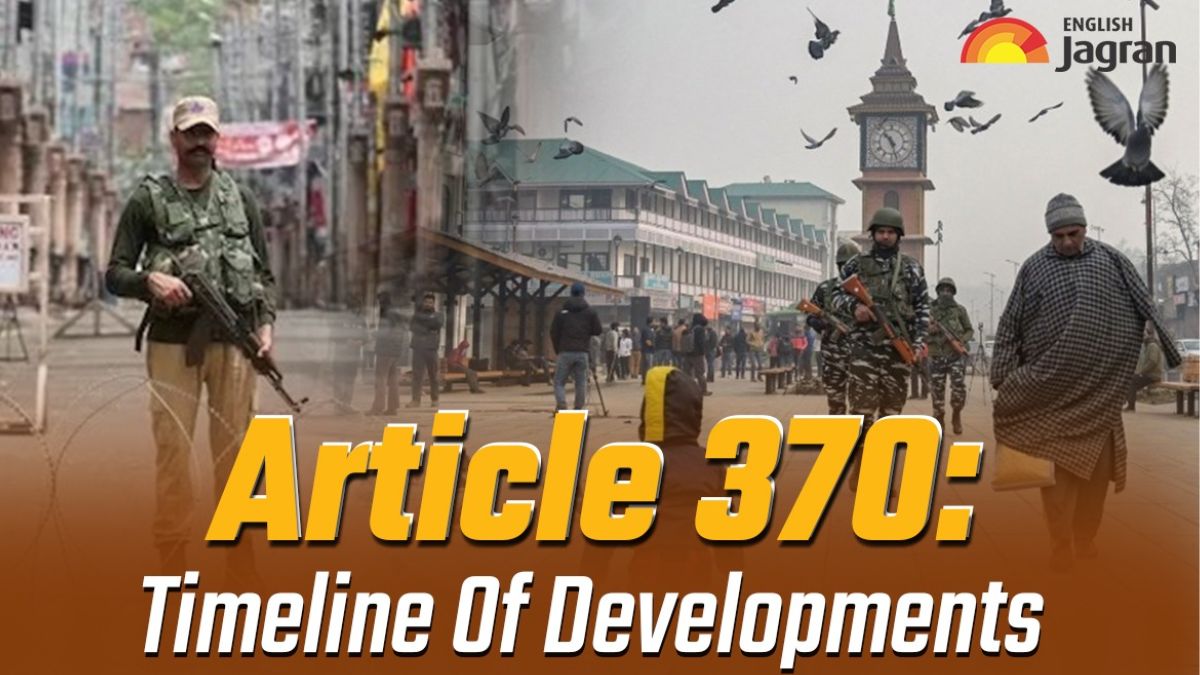- By Aashish Vashistha
- Tue, 12 Dec 2023 12:07 AM (IST)
- Source:JND
Article 370 Verdict: The Supreme Court in a unanimous verdict delivered on Monday, upheld the Centre’s decision to abrogate Article 370 of the Constitution, which had provided special status to the erstwhile state of Jammu and Kashmir. The top court stated that Article 370 was a temporary provision and asserted that Jammu and Kashmir possesses no unique internal sovereignty as compared to other Indian states.
The apex court emphasised that steps should be taken to conduct the elections to the Assembly in the Union Territory by September 30 next year. It further argued that the statehood of the union territory should be restored at the earliest.
Additionally, the top court also upheld the validity of the decision to separate the union territory of Ladakh from Jammu and Kashmir on August 5, 2019.
/cloudfront-us-east-2.images.arcpublishing.com/reuters/RXJSRDDB6FPBTKEOXS663YQVZY.jpg)
The Supreme Court in its verdict said that Article 370 was a temporary provision. (Image: Reuters)
About Abrogation Of Article 370 And Article 35A
In a historic decision on August 5, 2019, the government announced the abrogation of Article 370, which granted special status to the erstwhile state of Jammu and Kashmir. Special rights and privileges have been granted to the people of Jammu and Kashmir under Article 370 since 1954, under the Instrument of Accession.
Under Article 370, Jammu and Kashmir had the authority to have an independent constitution, a state flag, and internal self-governance when it was governed by India as a state from 1952 until October 31, 2019.
While Article 35A which comes under Article 370 granted special privileges and rights to the people of the state. It was introduced through a Presidential Order in 1954, on the recommendation of the J&K Constituent Assembly.
.jpg)
The government announced the abrogation of Article 370, which granted special status to the erstwhile state of Jammu and Kashmir on August 5, 2019.
Article 370: Here’s A Brief Timeline Of Development
December 20, 2018: President’s Rule imposed in Jammu and Kashmir while exercising powers under Article 356 of the Constitution.
August 5, 2019: In a landmark decision, the government announced the abrogation of Article 37, which granted special status to the erstwhile state of Jammu and Kashmir.
August 6, 2019: The first petition challenging the presidential order scrapping Article 370 was filed by advocate M L Sharma. Later, lawyer Shakir Shabir of Jammu & Kashmir joined the matter.
August 10, 2019: The National Conference (NC) filed a petition on August 10, 2019, claiming that the state's recent developments have deprived its citizens of their rights without their mandate.
August 24, 2019: The Press Council of India moved to the Supreme Court in support of the Centre's and the Jammu and Kashmir administration's decision to impose communication restrictions.
August 28, 2019: In response to a plea moved by the editor of the Kashmir Times for the removal of restrictions imposed on journalists, the Supreme Court issued notices to the Jammu and Kashmir government and the Center.
August 28, 2019: A bench led by the then Chief Justice Ranjan Gogoi referred the matter to a five-judge Constitution bench.
September 19, 2019: The apex court established a five-judge Constitution bench to hear pleas challenging the abrogation of Article 370.
March 2, 2020: The top court declined to refer a batch of petitions challenging the constitutional validity of the Centre’s decision to abrogate provisions of Article 370 to the larger bench of seven judges.
April 25, 2022: In response to a petitioner's urgent request for a hearing considering the delimitation exercise being carried out in Jammu and Kashmir, the Supreme Court agreed to consider listing after-summer vacation pleas challenging the Centre’s decision to abrogate provisions of Article 370.
July 11, 2023: The apex court stated that it will commence day-to-day hearings from August 2 on petitions challenging the abrogation of Article 370.
August 2, 2023: The Supreme Court started hearing petitions challenging the abrogation of Article 370.
September 5, 2023: Following a 16-day hearing on 23 petitions, the top court reserved its verdict on 23 petitions in the matter.
December 11, 2023: The Supreme Court upheld the government’s decision to abrogate Article 370, saying steps should be taken to conduct an election to the Assembly in Union Territory by September 30 of next year and directed that the statehood of the union territory should be restored at the earliest.

